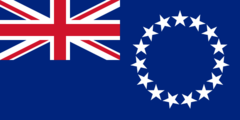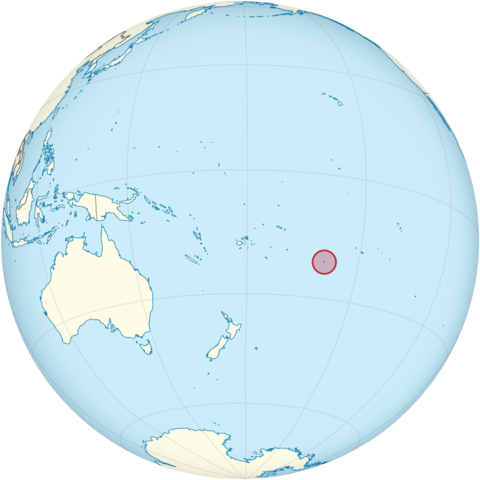 Among the most remote jurisdictions I will cover, Cook Islands are one of the Pacific tax havens along with such noteworthy neighbours as Samoa and Vanuatu.
Among the most remote jurisdictions I will cover, Cook Islands are one of the Pacific tax havens along with such noteworthy neighbours as Samoa and Vanuatu.
Cook Islands consist of 15 stunningly beautiful islands spread out in the warm waters of the south Pacific. This tax haven is an associated state of New Zealand, meaning it is all but an independent country. New Zealand acts on behalf of Cook Islands when requested to do so. Nonetheless, Cook Islands maintain some diplomatic relations of its own.
Cook Islands nationals are New Zealand nationals but the reverse is not true.
But we’re not here for that. Let’s get down to business.
Geography and Demography

Map from Wikipedia.
;
Full Name:;Cook Islands (Kūki ‘Āirani)
Official language(s):;English and Cook Islands Maori
Other major languages:;Pukapukan and Rakahanga-Manihiki
Type of government:;Constitutional monarchy
Area:;237 km²
Timezone:;UTC-10
Population:;11,000
GDP per capita:;9,000 USD
Currency:;New Zealand dollar (NZD), Cook Islands dollar (CKD) pegged to NZD at 1:1
[/table]Incorporation and Business
Reputation
Cook Islands are not very well known for business and incorporation. IBCs and LLCs formed here are most often used in asset protection structures that usually also include a trust. They are seldom used for trading or even holding outside of asset protection.
However, for those inclined to seek out these Pacific islands for setting up a trading or holding business, Asian and Pacific banks and business partners are familiar with the Cook Islands for trusts and may be accommodating to business entities. It can be a lot more challenging when it comes to other regions.
The jurisdiction as a whole enjoys an overall reputation. Despite this, secrecy is very tight. It is quite possibly the tightest run ship of all IBC jurisdictions.
General Information
There are two key aspects about the Cook Islands that make them stand. One is the requirement for companies to submit an annual financial statement. This need not show the entire books of the company; just the financial standing at the end of the fiscal year. The second is a non-public government registry of directors (IBC) or managers (LLC).
Other than that, it’s the usual IBC and LLC jurisdiction.
The jurisdiction’s lack of popularity stems from high costs, usually far higher than most other IBC jurisdictions.
Regulator
The Financial Supervisory Commission of the Cook Islands is the supervisor and FIU of the Cook Islands.
International Company (IC)
ICs are formed under the International Companies Act 1981-82. As of 2014, 1,090 ICs were registered and still active.
- One director required.
- One shareholder required.
- No paid up share capital required (usually 5,000 USD authorized).
- Registered address and secretary in Cook Islands required.
- Bearer shares are permitted but must be deposited with a custodian.
Taxation
None.
Limited Liability Company (LLC)
LLCs are formed under the Limited Liability Companies 2008 law. As of 2014, 383 LLCs were registered and still active.
Cook Islands LLCs offer the full flexibilities expected under an LLC. They are very commonly either wholly or partly owned by a trust in asset protection structures.
- One member required.
- Registered address and secretary in Cook Islands required.
- Bearer shares are permitted but must be deposited with a custodian.
Taxation
None. Pass-through entity.
Public Records
Directors and managers only.
Cook Islands Trust
Often touted as the strongest asset protection trust legislation in the world and described by the New York Times as a Paradise of Untouchable Assets, what is it really that makes Cook Islands so special?
For one, it’s tried and tested. A lot of jurisdictions out there may have laws similar to Cook Islands but don’t have high-profile cases to fall back on. As an indication to the strength of Cook Islands trust, even the powerful US authorities have failed to penetrate Cook Islands trusts that were correctly structured. However, trusts that have been improperly structured risk being and have been penetrated.
Trusts are regulated under the Trust Acts 1984 law. After changes made in 1989 (No23 and No33), the Cook Islands claimed it is the world’s first genuinely asset protection specific legislation.
While many jurisdictions have statute of limitations on fraudulent conveyance (fraudulent transfer) for four to five years, the Cook Islands have set their limit to two years.
The Cook Islands recognize court orders from two jurisdictions: itself and New Zealand. In reality, New Zealand has no interest in strong-arming Cook Islands and instead treat it as the sovereign state it is. It has so far looked the other way and deferred to Cook Islands for most matters.
Additionally, Cook Islands trustees are forbidden to act on instructions given to them by a settlor under duress.
As mentioned earlier, LLCs are often used together with a trust. A typical set up would be a trust owned by an LLC, for which the settlor and beneficiary of the trust is the manager. This empowers the settlor/beneficiary to manage the funds but only for the benefit of the trust. Should duress occur, the trust assumes management of the LLC until such time the duress has passed – for example when a court case has been abandoned or a creditor has given up.
What about the bank accounts? Don’t worry. The strict due diligence requirements and background checks placed on Cook Islands trustees enable the trust’s and LLC’s bank(s) to be content with the trustee becoming the new signatory on the bank account if the settlor/beneficiary is under duress.
Because it is not a banking center, criticism has been rather mild in Cook Islands’ tight secrecy and security surrounding trusts.
As of 2014, there were 2,620 trusts registered and active in the Cook Islands.
What about taxes? Good question. Asset protection and taxes are separate. Although exempt from taxation in the Cook Islands, assets placed in a Cook Islands trust are not automatically exempt from tax, especially if the settlor is also the beneficiary.
Service Providers
As always, this is not a recommendation.
There are six trustee companies (service providers) licensed in the Cook Islands, all of which are noteworthy:
Banking
Money held by the trusts are virtually never actually in Cook Islands. They usually bank elsewhere, in for example Singapore, Hong Kong, Switzerland, Lebanon, Panama, Liechtenstein, UAE, and so on.
In the grand scheme of things, there is virtually no international banking taking place in the Cook Islands.
Do not expect a bank in the Cook Islands to be particularly interested in you. Likewise, do not expect a bank in the Cook Islands to be particularly interesting to you.
Banking Secrecy
The law as such is fairly strict but does permit exchange of information for tax information as well as serious crimes.
Banks in Cook Islands
There are five banks in the Cook Islands, of which four hold both a domestic banking license and an international banking license.
- ANZ
- Bank of the Cook Islands (domestic only)
- Bank of South Pacific
- Capital Security Bank
- Westpac (sold its operations to Bank of South Pacific in July 2015)
Living in Cook Islands
As beautiful as these islands are, it is very difficult to settle down here.
Residency is available for investors willing to invest between 500,000 to 1,000,000 NZD in local real estate. However, there can at any given time not be more than 650 permanent residence permits issued.
Citizenship is impossible. To quote the Foreign Affairs and Immigration department: The Cook Islands does not have any laws pertaining to the grant of Cook Islands citizenship or nationality, and does not issue passports.
Final words
A very interesting jurisdiction which could be a very interesting and mostly-reputable alternative to IBC and offshore LLC jurisdictions.
However, trusts and asset protection are the key strengths of the Cook Islands. They are what make the international financial services sector the second biggest industry, after tourism.
See also
- OECD Peer Review of Cook Islands (also has a list of TIEA and DTA)
- Financial Secrecy Index Cook Islands
- FATF documents on Cook Islands
Hi Streber,
There are some cases where protection did not work as expected and Uncle Sam got what he wanted… You should talk about. Ok, they are related with crimes, etc, but I think it’s important to know.
I really like your blog… read and indicate as reliable reference.
Suggest you discuss Seychelles when you can … It’s a very interesting jurisdiction.
Regards,
Hi A. Chiang,
Thanks for pointing that out. I re-read the text and see it was perhaps a bit too positive/optimistic and added a mention about that trusts can be penetrated.
With regards to Seychelles, I will write an article about it in the not too distant future. It’s been requested several times in the past.